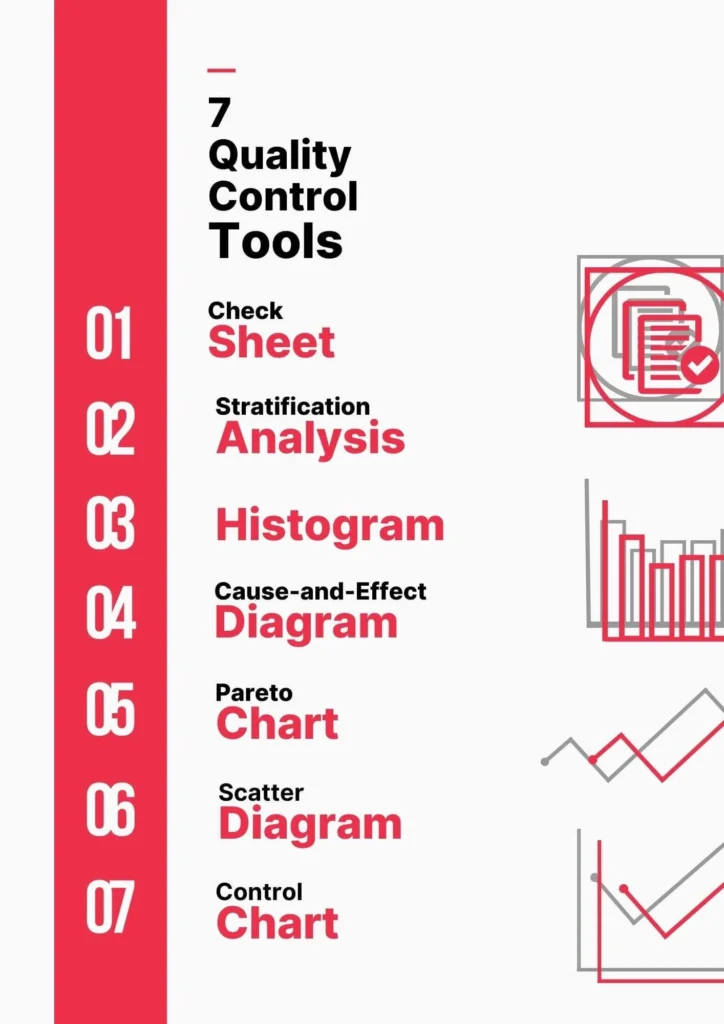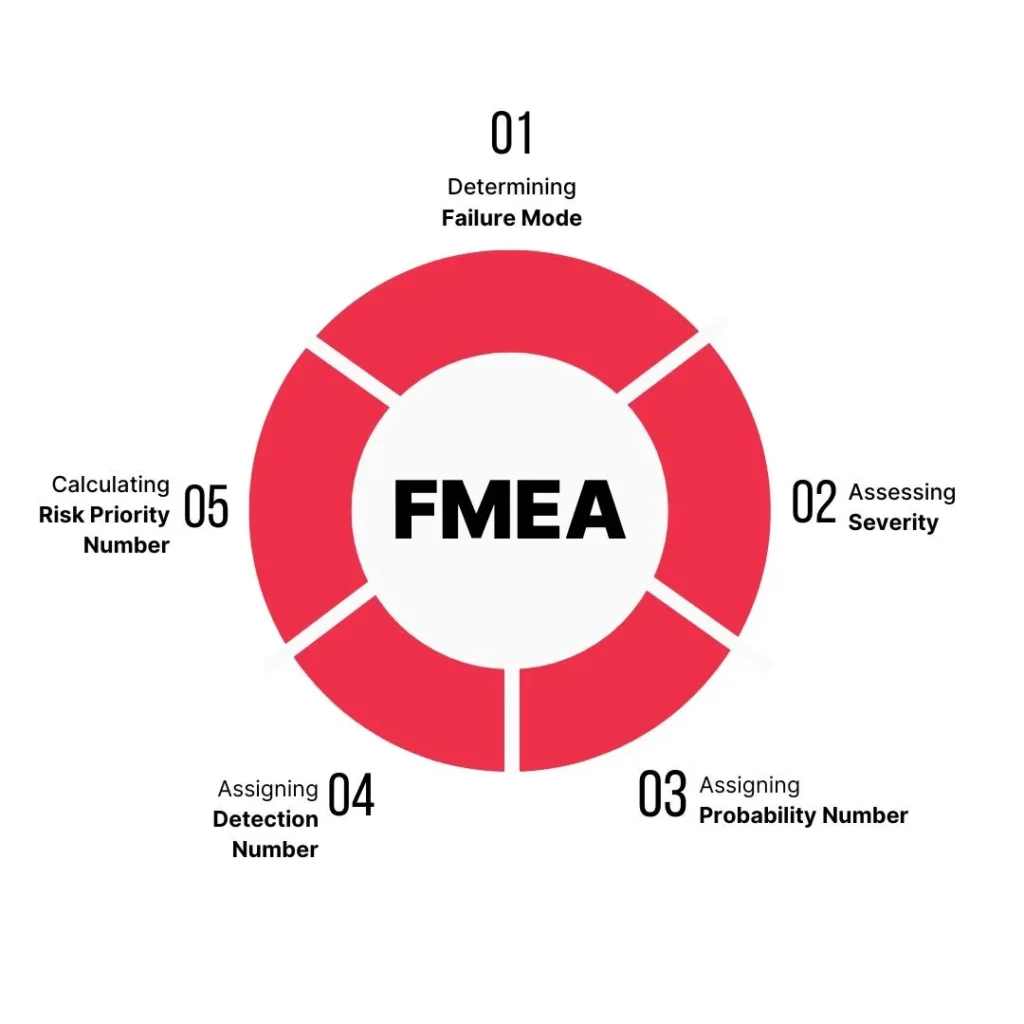

In the dynamic landscape of the manufacturing industry, quality assurance stands as a pivotal element ensuring product excellence and customer satisfaction. Beyond mere inspection stages, manufacturers deploy an array of sophisticated methodologies to uphold impeccable standards. In this article, we delve into the comprehensive quality assurance techniques we employ, shedding light on their efficacy in optimizing processes, minimizing defects, and fortifying operational efficiency.
Jolly Clamps employs the renowned 7 Quality Control (QC) tools as a cornerstone of our quality assurance strategy. These tools, including Pareto Analysis, Ishikawa Diagrams, and Control Charts, allow us to systematically identify, analyze, and address potential issues in our manufacturing process. By leveraging these tools, we continuously refine our processes to achieve optimal efficiency and eliminate defects.

To enhance our error-proofing mechanisms, we have integrated Poka Yoke (mistake-proofing) techniques into our manufacturing processes. These techniques involve designing foolproof systems and mechanisms that prevent errors before they occur and monitoring the sustenance. This not only reduces the likelihood of defects but also streamlines our operations, contributing to the overall efficiency and reliability of our clamps.
At Jolly Clamps we have implemented FMEAs and are committed to following a risk based approach for all the processes. Throughout our journey, FMEA has been a very helpful tool to identify and eliminate the issues even before the occur, which helps us to keep our rejection percentage at par minimum level. It helps us prioritize areas for improvement based on the severity, occurrence, and detectability of potential failures.

A robust quality control framework necessitates planning and execution. At Jolly Clamps, we implement detailed Control Plans that outline every critical step in the manufacturing process. These plans specify key parameters, inspection points, and control measures to ensure consistency and adherence to quality standards. By adhering to these control plans, we guarantee the uniformity and precision of our clamp products.
SPC involves monitoring and controlling production processes through statistical methods. Control charts, histograms, and process capability analysis are common SPC tools used to detect variations and maintain process stability. Capability indices assess the capability of a process to produce products within specification limits. Cp measures the potential capability, while Cpk measures the actual capability, accounting for any deviations from the target.
Visual inspection is a major part of our inspection process. It involves manually checking products for defects, irregularities, or deviations from specifications. Along with the previous “Lesson Learned”, “Quality Alerts” and “Defect Displays” as each production and inspection stage, visual inspection helps each and every operator to identify and prevent any defective product from passing to the next process.
Conducting MSA assesses the reliability and consistency of measurement systems at our facility, ensuring that our equipment and operators provide accurate and repeatable results may it be variable of attribute characteristic.
At Jolly Clamps, improvements are proposed, implemented and appreciated from our operators as well as our staff. These incremental improvements in our processes have been helping us to optimize and improve them. It involves the entire workforce and fosters a culture of continuous learning and enhancement. We take pride in announcing our IATF 16949 and EMS certifications, reflecting our dedication to meeting the highest standards in automotive quality management and environmental responsibility.
The IATF 16949, ISO 14001 and ISO 45001 certifications seamlessly integrate with our existing quality control measures, creating a harmonized approach to excellence. Every step of our manufacturing process, from raw material inspection to final product testing, aligns with the principles of these certifications. By following strict guidelines and protocols, we ensure that Jolly Clamps not only meet the standards but sets new benchmarks for quality and sustainability in the industry.
The IATF 16949 certification emphasizes the importance of traceability throughout the supply chain. At Jolly Clamps, we have implemented robust traceability systems that allow us to track and verify the origin and journey of every component used in our clamps. This not only ensures compliance with certification requirements but also enables us to quickly respond to any quality-related concerns, further enhancing customer satisfaction.
In conclusion, mastering quality control in manufacturing requires a multifaceted approach, encompassing cutting-edge tools, rigorous methodologies, and unwavering commitment to excellence. As evidenced by Jolly Clamps’ adoption of renowned QC techniques and adherence to industry-leading certifications, the pursuit of quality is not merely a goal but a relentless journey towards perfection. By integrating fool proofing techniques, statistical process control, and continuous improvement initiatives like Kaizen, manufacturers can elevate their standards, surpassing customer expectations, and carving a niche of excellence in the competitive landscape. Embracing the ethos of traceability, accountability, and continuous improvement, Jolly Clamps exemplifies the pinnacle of quality craftsmanship, setting new benchmarks for the manufacturing industry. Join us in championing the culture of quality, where innovation, precision, and relentless pursuit of perfection converge to redefine the standards of excellence in manufacturing.
Enquire Now


https://jollyclamps.com/wp-content/uploads/2021/08/Jollyclamps-compressed.pdf
Error: Contact form not found.